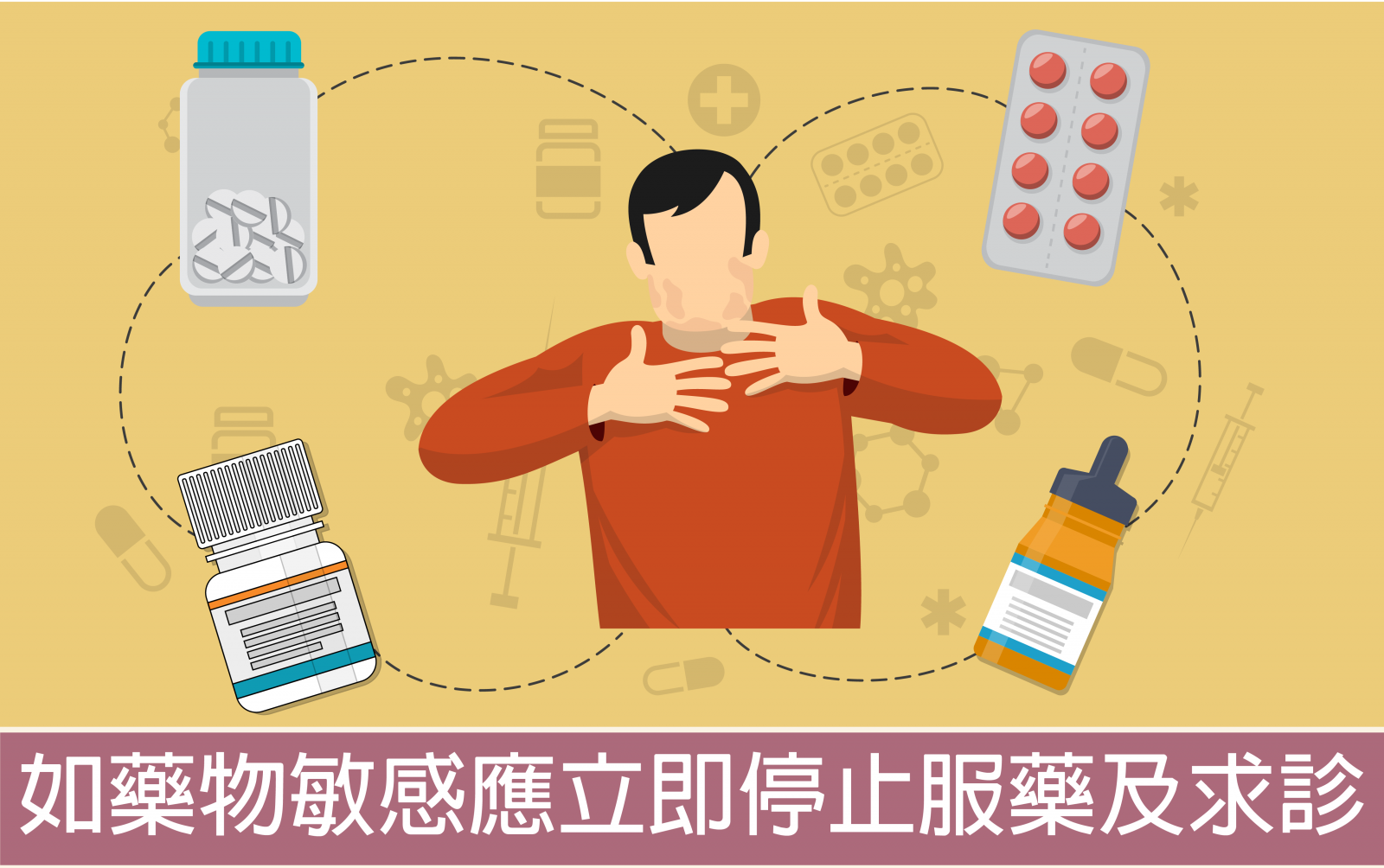[Pharma Tips] Can I take medicine during pregnancy?
08/08/2023
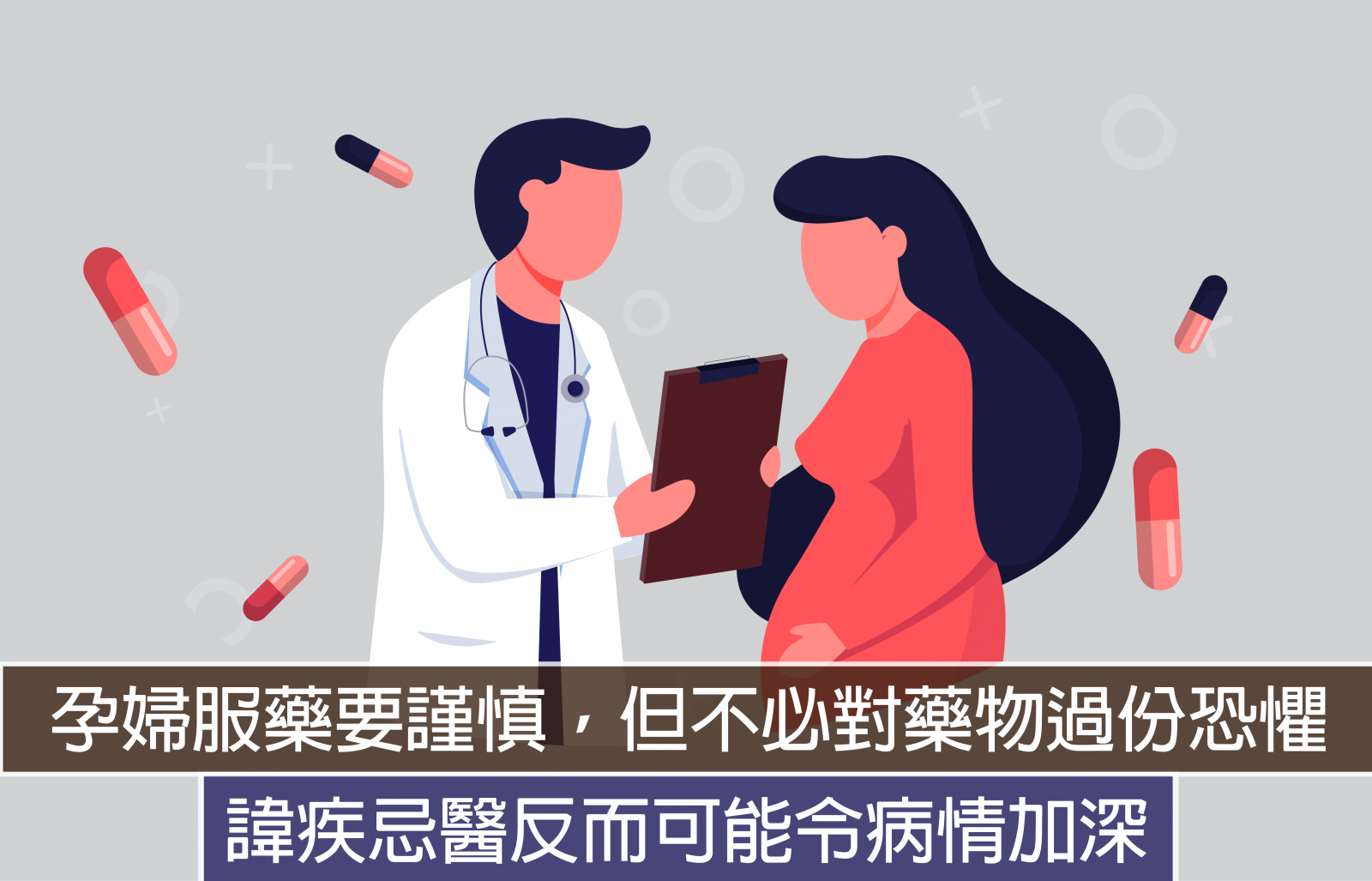
Reports on birth defects due to taking the medicines by mistake by pregnant women often appeared on the media. That is why a number of pregnant women avoid taking any kind of medication even if they are ill, as they are in fear of their effects on the fetus. Is it still correct in this era with well-developed modern medicine?
Women with serious or chronic diseases, such as asthma, diabetes, high blood pressure and seizure, might need to continue taking the prescribed medicines as usual. That is because the health risks of stopping medication might be higher than that of taking medication during pregnancy.
Although some medicines are safe to use during pregnancy, it is true that some will have harmful effects on the fetus. A drug’s effect on the fetus is determined mainly by drug potency, dosage, duration of drug exposure, and placental permeability, etc. Never take the over-the-counter medication or drugs given by others on your own without getting prior professional advice. Check the drug label to learn about the possible risks for pregnant women. There are some medicines which have proved to cause birth defects or effects on the fetus, such as:
- Cancer drugs such as thalidomide and methotrexate
- Antibiotics such as tetracycline and streptomycin
- ACE inhibitors which lower blood pressure
- Anticoagulant medicines such as warfarin
- Seizure drugs such as phenytoin and phenobarbitone
- Acne medicines containing isotretinoin
Be extra careful when taking medication during pregnancy. No need to worry too much about drugs. Do not be afraid to see the doctor before it is too late which might have a more serious effect on the fetus. Inform your doctor of the gestational age and the doctor will give you advice on the safe use of medicine.
[Pharma Tips] Why am I getting sunburn even after applying sunscreen?
08/07/2023
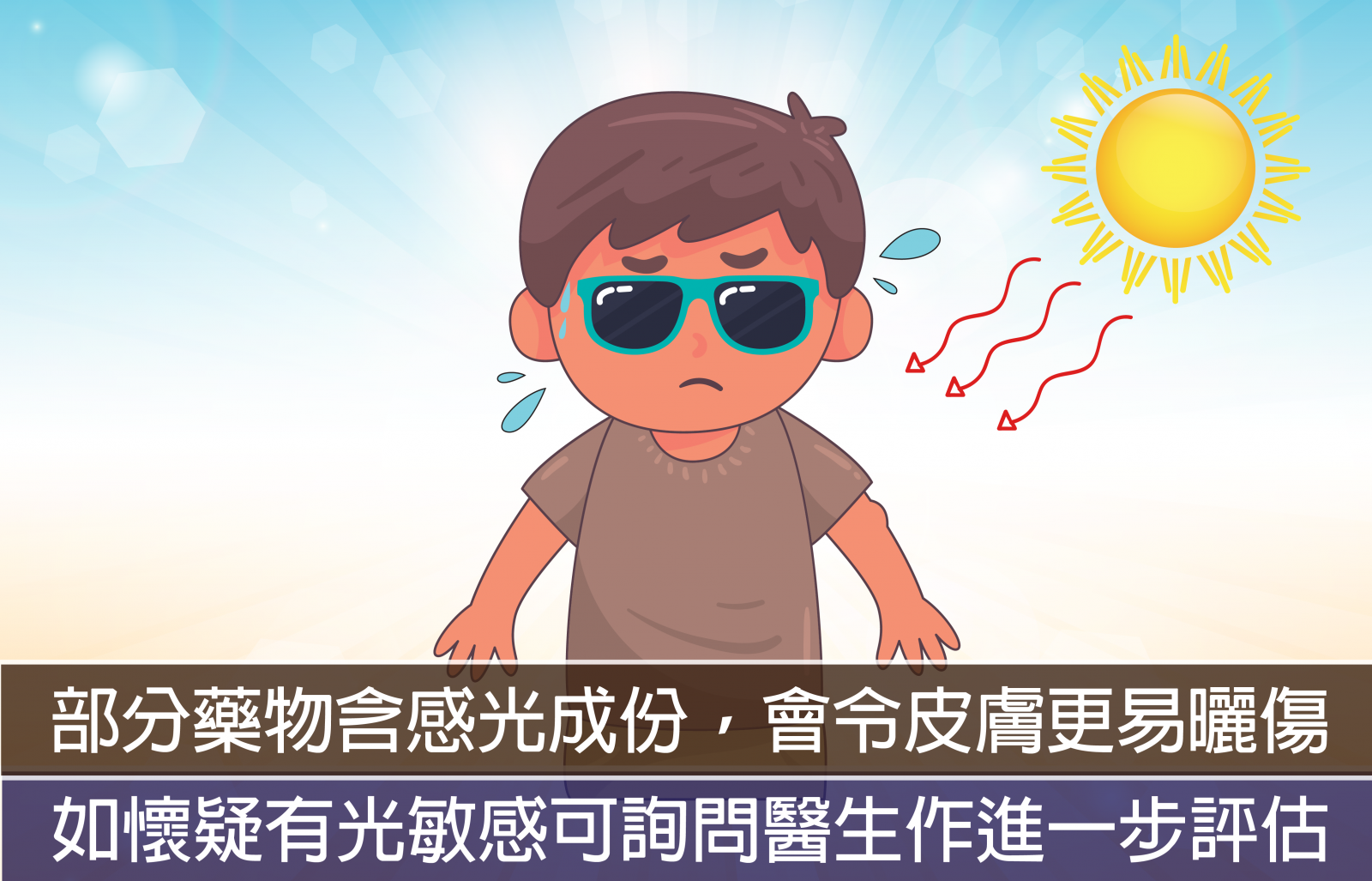
Walking on the streets under the scorching heat of the sun, the skin burns easily. People will take actions to protect themselves from sunburn and lower the risks of getting skin cancer on days when the UV index is high. However, why are we still getting sunburn even when adequate protective measures are taken? Do not blame your sunblock because the medication you took may be the culprit!
Taking photosensitive drugs will make your skin more sensitive and vulnerable to sunburn. This is what we called “photosensitivity”. UV radiation in sunlight reacts with the photosensitive drug to produce chemicals harmful to the skin cells, causing inflammatory reactions. Symptoms include itching, redness, pain and rash. Since the symptoms are similar to that of eczema, most do not realize that it is photosensitivity reaction. Examples of medicines that can cause photosensitivity reaction include:
- Cancer drugs such as thalidomide and methotrexate
- Antibiotics such as levofloxacin and ciprofloxacin
- Non-steroidal anti-inflammatory drugs such as naproxen and piroxicam
- Isotretinoins
- Diuretics such as furosemide and hydrochlorothiazide
This is not a complete list. There are numerous kinds of photosensitive medicines and not every person who uses these medicines has a reaction. If you notice that your skin is more sensitive to the sun after started on certain medication, do not stop taking it suddenly. Instead, talk to your doctor for further assessment. You can also protect your skin by wearing sun-protective clothing, carrying an umbrella or avoid going out when the UV light is the strongest.
[Study Completion] Phase 1 Clinical Trial on Eye Drop for Myopia Control Was Completed!
29/06/2023
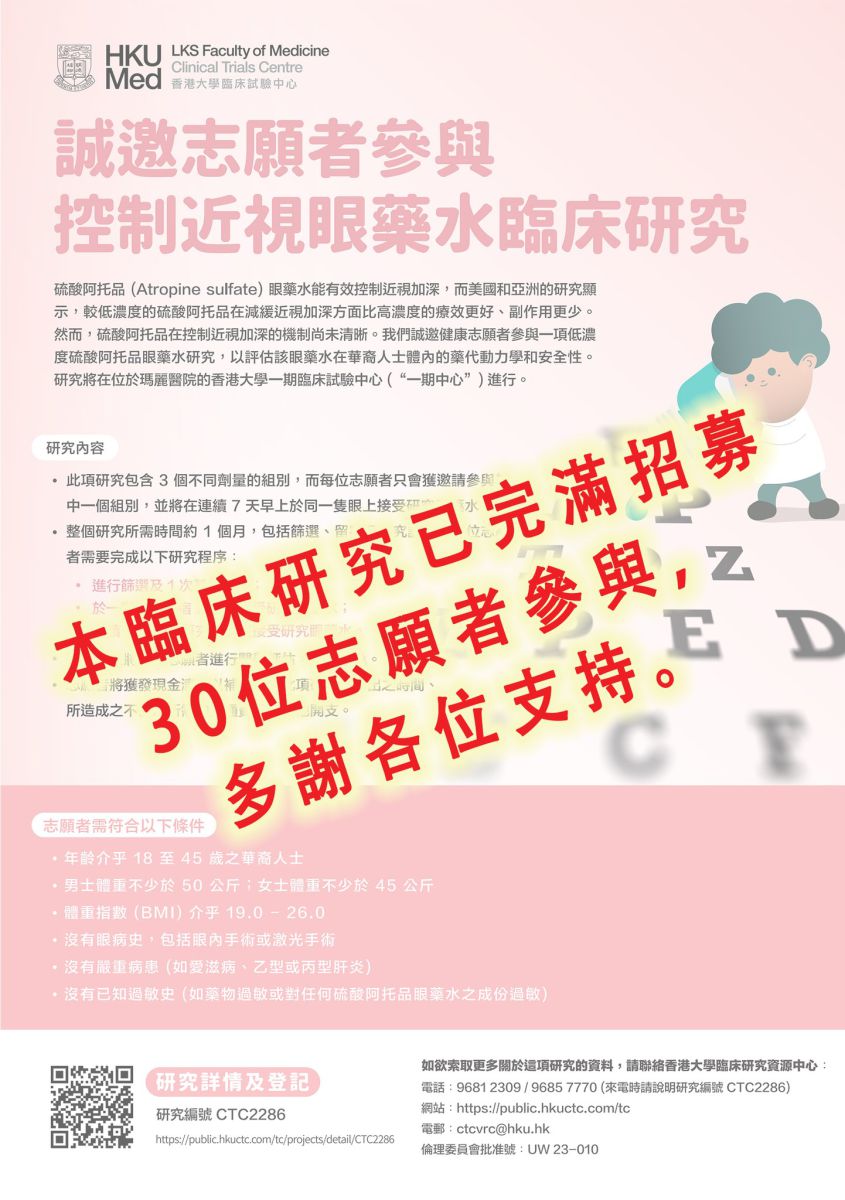
[Study Completion] Phase 1 Clinical Trial on Eye Drop for Myopia Control Was Completed!
29/06/2023
COVID-19 nasal spray vaccine offers the first line of defense against virus
15/06/2023
[Pharma Tips] Which is better, injection or oral medication?
08/06/2023
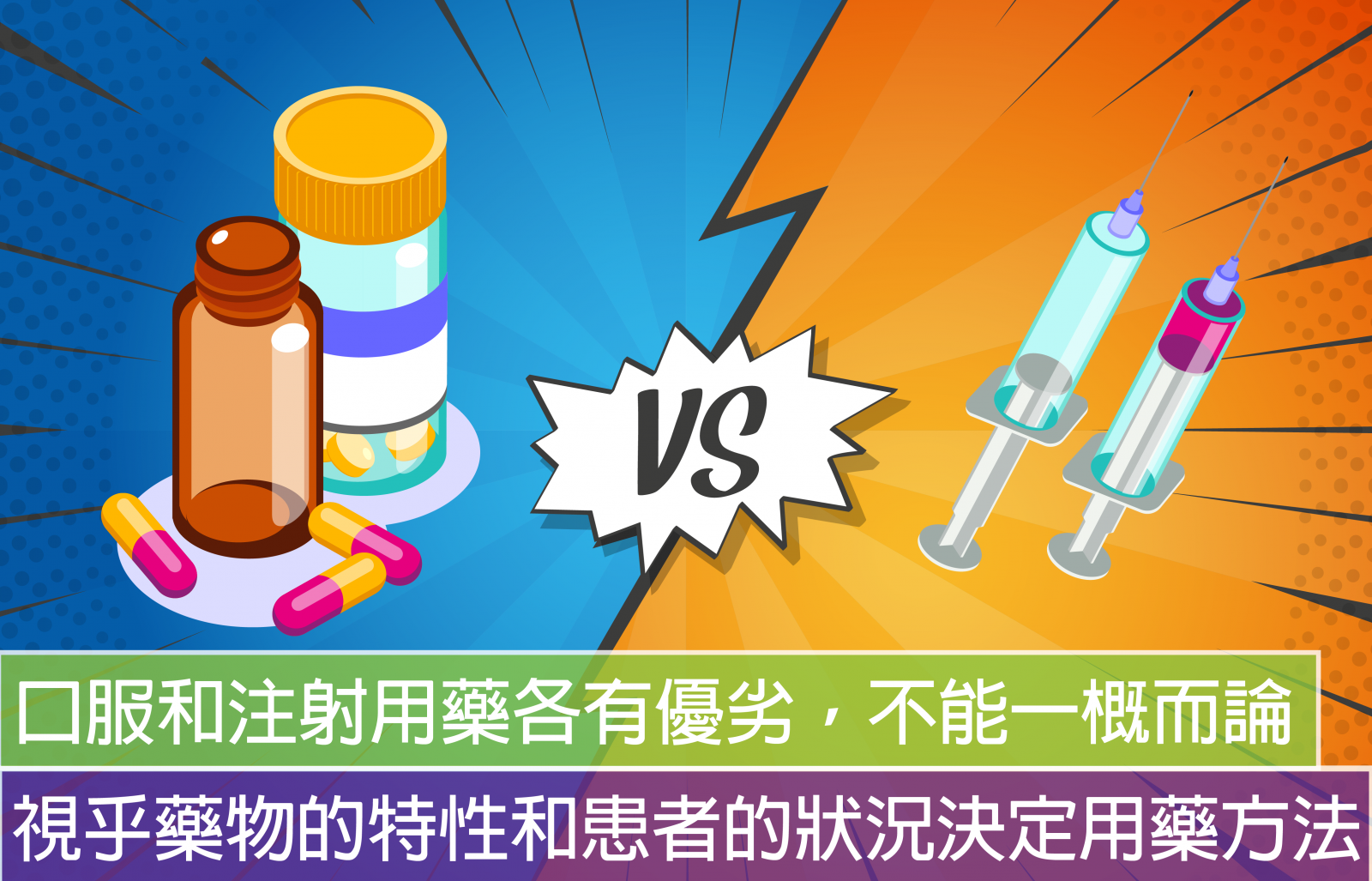
When we were young, we were often educated by our parents that an injection is better than oral medication as it is more effective in curing the illness. The younger we could only suffer the pain of injection. Why doesn’t the doctor give us injection as often as before after we grow up?
Oral medication and injection are two different methods of administration. They have their own pros and cons. Oral medications are the most economical and convenient way of administration. Taking the medicine orally is convenient and patients can simply take it at home. Injection usually acts faster on bodies and has a shorter induction period. For people who have trouble swallowing pills, injection is the only option. Medicines like insulin is a protein which will be digested in our stomach so it cannot be orally administered. It is usually administered by subcutaneous injection. The injectable antipsychotic drugs have long-lasting effects and the patients only need to take them once in a few weeks. It is ideal for patients who have difficulties in following the dosing schedule and they can still keep up with the treatment.
Is injection or oral medication better? There is no absolute answer to this question. It depends on the drug and also the conditions of the patient. Follow the instructions of the doctor and choose the safest way will do.
[Pharma Tips] Can the blending of Western and traditional Chinese medicine boost treatment?
08/05/2023
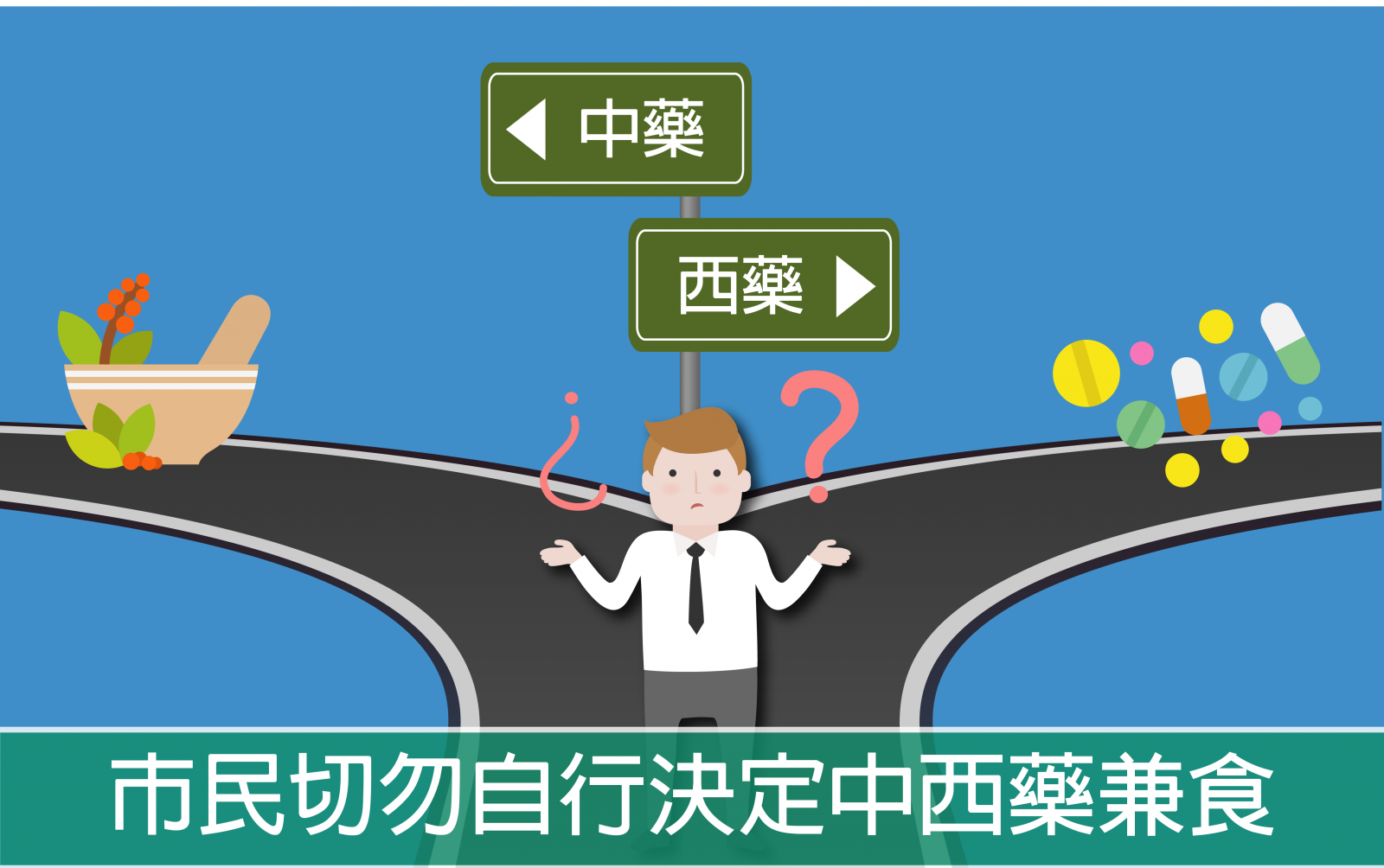
[Pharma Tips] Can the blending of Western and traditional Chinese medicine boost treatment?
08/05/2023

Hong Kong is a city where the cultures of east and west meet. A lot of people will combine both traditional Chinese and western treatments when they are ill. Is this synergistic or antagonistic?
Although Chinese medicine might seem milder, the fact is all of them have their active ingredients and they might react with the chemicals in the western medicine. Some said they should be taken at least two hours apart. However, if the effect is long-lasting, two hours might not be sufficient to avoid the drug interactions.
The best way is to consult your doctor before deciding on combining the two kinds of treatment. No matter such method is strengthening or weakening the efficacy, they will both increase the burden of your body especially the liver. Never make the decision on your own but seek professional advice first.
[Pharma Tips] What is drug allergy?
08/04/2023

Doctors always ask if the patient has drug allergies during medical consultation. Such information will be clearly written on the medical history. Drug allergy is not uncommon and its consequences can be disastrous so do not neglect its importance.
Drug allergy is an immune response when your immune system reacts to a certain type of medicine. The drug type and symptoms vary from person to person. Hence, all medications are capable of inducing an allergy. You may not experience allergic symptoms the first time you take a drug but it might happen the next time. Common symptoms include skin rash, swollen lips, wheezing, etc. Stop the medication immediately and seek doctor’s advice if any of allergic reactions appear.
Some will mix up drug allergy with side effect. Drug allergy is related to the health conditions of individuals. It is unpreventable and unpredictable. What we can do is to avoid it from happening again after we discover it. Side effect is an undesirable effect occurs in addition to the desired therapeutic effect of a drug. It is usually related to the dosage and can be found out by pharmacology and clinical research.
[Pharma Tips] Can I crush the medicine?
08/03/2023
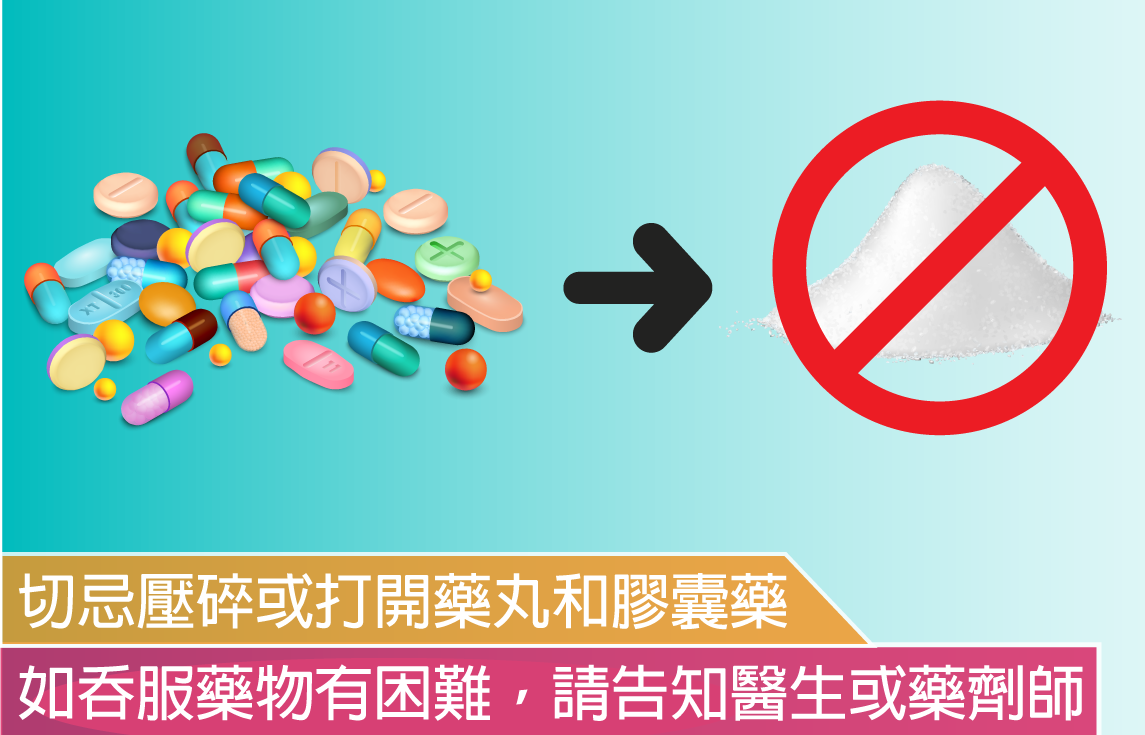
Why do the doctor always advise us not to crush the tablets or open the capsules? Let me explain to you the reason behind!
Some medications are specially designed and should never be crushed or cut, such as controlled-release and sustained-release pills. They are designed to release slowly over time into the body. Crushing them will lose such function and result in a sudden surge of drug concentration and hence an overdose. Most capsules should be swallowed whole and never take out the powder inside. The coating of the tablets and capsules protects our stomach wall as well as protects the drug from erosion by gastric acid. It can also mask the bitterness of drugs so we can swallow them easily.
If you or your children have difficulties in swallowing the tablets or capsules, tell your doctor or pharmacist. They will suggest alternatives with different methods of administration, such as syrup or water-soluble drugs.
[Centre News] Secondary school student visited HKU Phase 1 Clinical Trials Centre
27/02/2023

[Centre News] Secondary school student visited HKU Phase 1 Clinical Trials Centre
27/02/2023
On February 23, 2023, a group of secondary school students were given a rare opportunity to visit the HKU Phase 1 Clinical Trials Centre. They learned about the importance of ethical considerations, volunteers’ safety and data integrity, as well as the role that clinical trials play in advancing medical knowledge and improving patient care. As the students toured around the facility, they were impressed by the level of details put into the Centre’s design for safety and accuracy. The visit highlighted the importance of clinical trials in advancing medical knowledge and left a lasting impression on the students, inspiring them to consider careers in medical research and healthcare.

[Pharma Tips] Can I buy medicines overseas?
08/02/2023

Many people will purchase medicines aboard as they think those products are more effective with better quality. Some might even put the medicines up for sale over the internet. Medicines are not ordinary products. The import and sale of pharmaceutical products in Hong Kong are regulated by legislations. Sale of these products online might have infringed the law too!
In Hong Kong, medicines must be registered before sale. The safety, efficacy and quality of the pharmaceutical product will be assessed before getting an approval for registration. Other than that, the local legislation in regulating the pharmaceutical products might be more stringent than that in other countries. One has to obtain specific licenses before importation and sale to protect the public safety. Unregistered pharmaceutical products of doubtful composition purchased overseas might not be able to cure the diseases and their safety and quality cannot be guaranteed.
You are advised to visit registered pharmacies with a “Rx” logo displayed outside the shop. The registered pharmacists will recommend the most appropriate medicine for you and it is the safest way to go!




